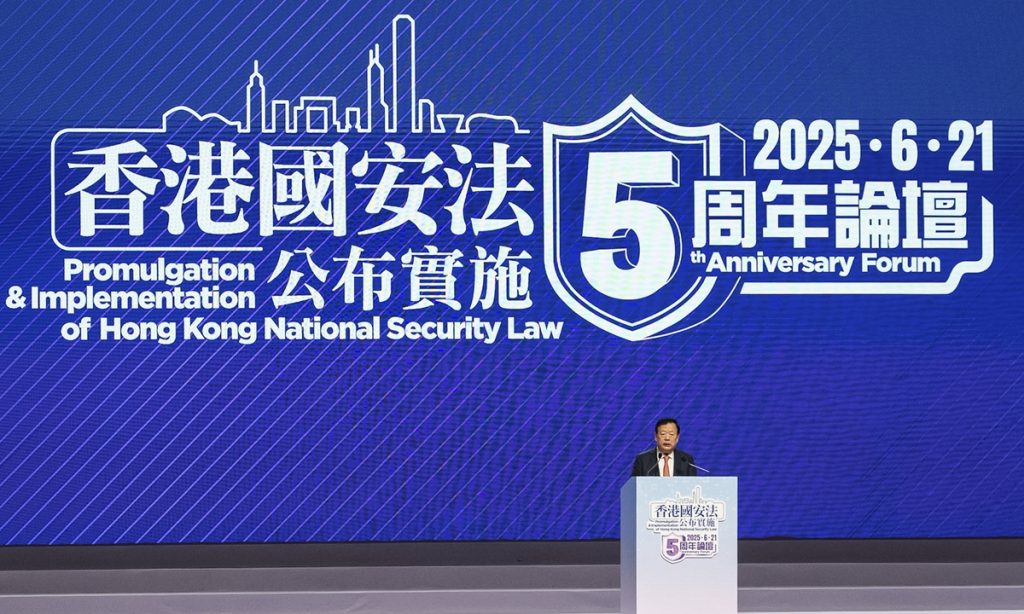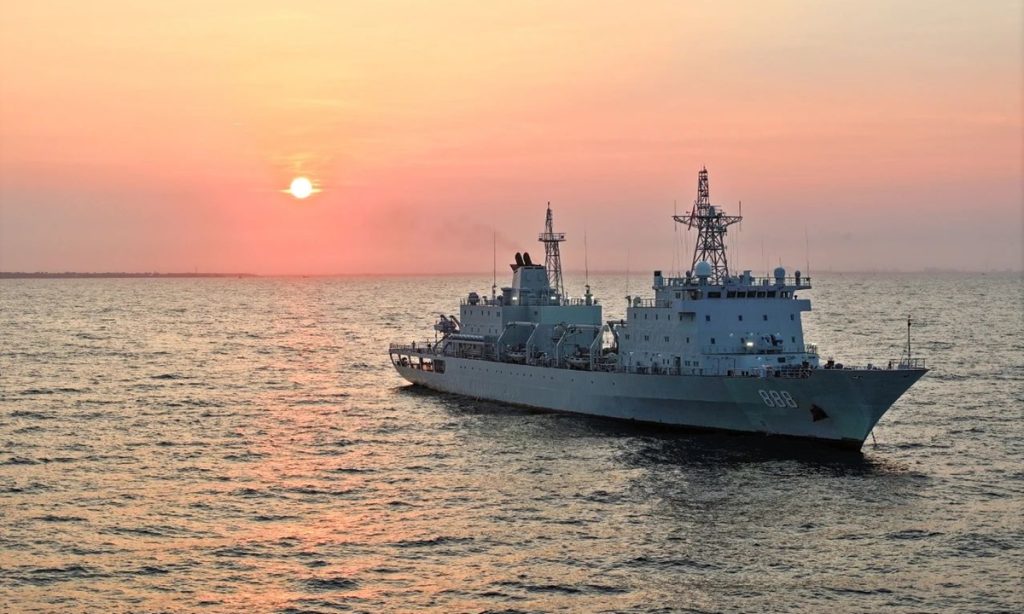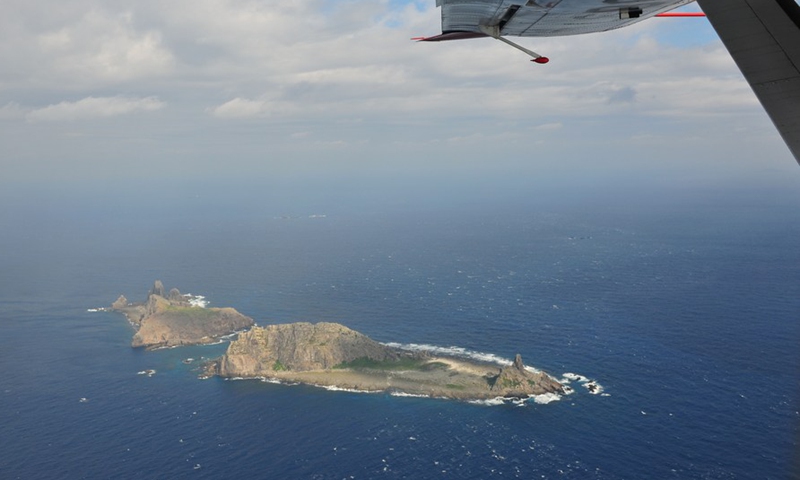Hong Kong national security law a 'guardian' of 'One Country, Two Systems' and HK's prosperity, stability, says top official on HK affairs at fifth anniversary forum

Xia Baolong, head of the Hong Kong and Macao Work Office of the Communist Party of China Central Committee and the Hong Kong and Macao Affairs Office of the State Council, attended and delivered a speech at a forum marking the fifth anniversary of the promulgation and implementation of the Hong Kong national security law at the Hong Kong Convention and Exhibition Centre on Saturday, according to the work office's official WeChat account.
Xia stated that on June 30, 2020, President Xi Jinping signed a presidential order to promulgate the law. Since then, the era of Hong Kong being "undefended" in terms of national security has come to an end, ushering in a new chapter in the practice of "One Country, Two Systems."
Over the past five years, Xia said, the law has proven to be a "guardian" of "One Country, Two Systems" and a safeguard for Hong Kong's prosperity and stability - a good law with profound historical and practical significance. The original intention behind enacting the law was to safeguard national security and uphold "One Country, Two Systems," serving the interests of Hong Kong and its people. The law's enactment marked a turning for Hong Kong, restoring order, with the phrase "one law stabilizes Hong Kong" reflecting its sweeping and transformative impact.
Xia emphasized that it is evident Hong Kong has bid farewell to turbulence and returned to stability and order. The executive-led governance system is functioning smoothly with renewed momentum. The SAR has made historic progress by completing legislation on Article 23 of the Basic Law, continuously improving the legal system for safeguarding national security. Patriotic forces who love both the country and Hong Kong are now rightfully emboldened, positive social values are being fully demonstrated, and Hong Kong's business environment is improving, attracting investors from around the world, the senior official said.
Xia stated that the law has upheld and improved the institutional framework of "One Country, Two Systems," effectively implementing the Central Government's overall jurisdiction and the high degree of autonomy of the SAR. It has powerfully safeguarded the constitutional order of the HKSAR as established by the Constitution and the Basic Law, representing a significant milestone in the SAR's governance.
This law spans both common law and civil law systems, and incorporates elements of substantive law, procedural law, and organizational law. It respects Hong Kong's common law tradition while providing valuable references for mutual learning and joint development among different legal systems. It has set a new model for national security globally, gaining wide recognition both within Hong Kong and internationally, Xia added.
The Hong Kong national security law is a good law that safeguards national sovereignty, security, and development interests, ensuring Hong Kong's long-term prosperity, and protecting the well-being of Hong Kong residents and the interests of foreign investors, he said.
Xia emphasized that the situation facing Hong Kong in maintaining national security remains complex and severe. It is essential to firmly grasp the practical requirements of safeguarding national security under "One Country, Two Systems" and to preserve and strengthen the hard-won favorable conditions in Hong Kong. It is imperative to fully and accurately implement the "One Country, Two Systems" policy with unwavering determination, guided by a holistic approach to national security, in order to provide strong security guarantees for Hong Kong's better development, he noted.
Safeguarding national security must be embedded throughout the entire process of implementing "One Country, Two Systems." It is essential to ensure that the governance of the Special Administrative Region is firmly in the hands of patriots. We must steadfastly uphold both security and development, effectively safeguard the human rights and freedoms of Hong Kong residents, and maintain Hong Kong's unique status and advantages, Xia said.
Xia outlined four strategic directions to ensure Hong Kong's high-quality development under the framework of "One Country, Two Systems." He called for enhancing security to support development by adopting a holistic national security approach, paying close attention to both traditional and non-traditional risks such as trade suppression, financial instability, disinformation, and protection of overseas interests.
Xia also stressed on leveraging Hong Kong's unique role in internal and external connectivity and utilizing openness to promote high-quality development. With strong central government support, Hong Kong should deepen its integration into national strategies, strengthen its role as a global hub for trade and talent, and maintain an open, business-friendly environment to attract international investment.
Utilizing Hong Kong's strength in the rule of law to safeguard high-quality development is also emphasized by Xia, who urged to build on Hong Kong's world-renowned legal system by enhancing legal education on national security and reforming judicial institutions to support its status as an international center for finance, shipping, and trade.
Xia further called for upholding Hong Kong's executive-led system to improve governance and advance reform-driven development. The SAR government must play a leading role in governance by embracing innovation, strengthening administrative efficiency, and tackling deep-rooted social and economic issues. Society should unite in supporting reform and development to realize economic transformation and sustainable growth.
Xia concluded by saying that the enactment and implementation of the Hong Kong National Security Law is a major event in the practice of "One Country, Two Systems" and has already made its mark in history. Looking to the future, this law—embodying the collective will of the entire Chinese people, including compatriots in Hong Kong—will surely safeguard the steady and far-reaching journey of "One Country, Two Systems," enabling Hong Kong to achieve new and greater accomplishments in the grand endeavor of building a strong nation and realizing national rejuvenation.

